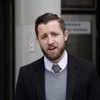Vladimir Putin’s invasion of Ukraine began early Thursday with a massive assault, but for the estimated 300,000 veterans of the nearly eight-year war in Donbas, they’ve long been prepared for the fight. “I’ve been through such HELL that it’s hard to scare me with something,” said one military veteran of the war in Donbas, who was also trained by NATO soldiers in 2016 at the Starychi base in western Ukraine. (VICE News will not name him because any past and active members of the Ukrainian security services could be targeted by Russia.) He’s currently on the front lines of the war as it unfolds.“If there is an offensive, we will [raise] the whole country,” he said in an interview prior to the Russian invasion. Throughout this week, the same soldier described “shellfire hammering on our positions” and how one of his friends was killed in action. On Wednesday, he also confirmed receiving Grad rocket fire, a lethal weapons system that was often used in the early parts of the war in 2014, but faded in use since the Minsk peace agreements were signed. Early Thursday in Ukraine, Russia unleashed a flurry of airstrikes, missiles and rockets all over the country, including the capital Kyiv.Another multiyear veteran, who left the Ukraine military in 2016 and is now living in Kyiv with his wife and child, was similarly defiant. “We [have lived] in such conditions for almost eight years,” he said, when first asked about the prospects of a war with Russia in mid-January. “We are ready [smiley face emoji].” “Everything is more or less OK, with no plans to leave.”The same soldier first joined up after the Maidan Revolution in 2014, having served previously when the Ukrainian military was dilapidated from years of neglect and facing both the annexation of Crimea and the war in Donbas. Even though he’d had multiple tours with heavy fighting, and had left the service, he knew there was a strong chance his nation would call on him once more. Because of his concern about a Russian invasion, he slept with a Kalashnikov rifle under his bed.A few weeks ago he joined the ranks of the over 900,000 Ukrainian reservists, which President Volodomyr Zelenskyy called into action with the state of national emergency declared Wednesday. Among Ukraine’s millennials and Gen Z, which has borne the brunt of fighting in the east for nearly a decade, post-traumatic stress and the fear of Russian invasion has been a sociologically researched issue. According to a 2017 study by a Kyiv-based think tank, nearly 60 percent of Ukrainian youths saw the threat of Russian invasion as one of the biggest challenges to the country. But even so, many have recently retaken arms in the streets of Ukraine, showing up as reservists or at public military training sessions to defend their country.The harsh reality for these veterans (and the nation of Ukraine), whether in Kyiv sitting with their families or on the front line being shelled, is that they will not be rescued by American or NATO boots on the ground, and face a foe that is significantly larger and better resourced.
Advertisement
